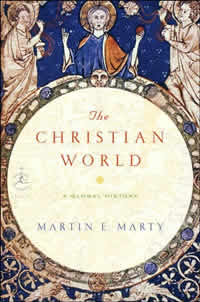Book Notes
 Martin Marty, The Christian World; A Global History (New York: Random, A Modern Libray Chronicles Book, 2007), 263pp.
Martin Marty, The Christian World; A Global History (New York: Random, A Modern Libray Chronicles Book, 2007), 263pp.
How do you tell a story that spans two millennia and six continents, that today includes 2.2 billion adherents, and limit yourself to two hundred pages? First off, you hire Martin Marty. For thirty-five years Marty taught at the University of Chicago and distinguished himself as one of the country's premier (American) church historians. He's written more than fifty books, and his honors include the National Book Award, the National Humanities Medal, and the Medal of the American Academy of Arts and Sciences. As an ordained Lutheran minister, Marty is also an enthusiastic participant in the Christian story he tells.
Christianity has splintered into 38,000 denominations around the globe, but Marty suggests that its singular "provocative theme" in all times and places is the human Jesus who is worshipped as the exalted Lord. This "minimalist" formula, of course, has given rise to "numberless variations." "Witnessing to, seeking to serve, placing hopes in, globally propagating a vision of this God-Man, or Man-God, gives Christianity its distinctive character and force" or "marked idiosyncrasy." Beginning at the beginning, with the tireless apostle Paul who trekked at least 8,000 miles spreading the news about Jesus the Lord, Marty narrates the Christian story in its Roman Catholic, Orthodox, and Protestant permutations. After these "Jewish Beginnings" he proceeds geographically. Chapters two and nine consider Asia, chapters three and eight Africa, chapters four and five Europe, and then Latin America and North America in the middle chapters six and seven.
As a "global" history of Christianity, Marty draws special attention to the uniquely formative influences, both early and modern, of Asia and Africa. In its oldest and newest forms Christianity is especially African and Asian. Europe was was relative latecomer to the Christian story, and today appears to be in decline, playing a smaller and smaller role in the overall plot. Another strength of Marty's narrative is the considerable time spent telling how Christianity has been the source of suffering and violence. Christians have slaughtered Jews, Muslims, Native Americans, slaves, and, in the Thirty Years War, about ten million of their fellow Christians. To deny this would be like trying to make your family history sound better than it is. But the story lives on, and in this telling its history is in the capable hands of a willing participant and gifted scholar.


